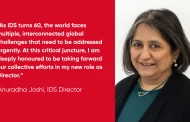By Attahiru M. Jega, PhD

The author
Introduction
I begin by expressing my sincere thanks and appreciation for the honour done to me with the invitation to deliver this Keynote address, at today’s AIG Public Leaders Programme Closing Ceremony. Special thanks Mr. Aigboje Aig-Imoukhuede and Mrs. Ofovwe Aig-Imoukhuede, Chair and Executive Vice Chair, respectively, of the AIG-Imoukhuede Foundation, who have been doing various commendable philanthropic programmes and projects, including this Public Leaders Programme to help build social capital, transform and reposition the African and Nigerian public sectors as catalysts of growth and development. I am glad to be associated with their excellent work, both as the pioneer African Initiative for Governance (AIG) sponsored Visiting Fellow of Practice at the Blavatnik School of Government, University of Oxford (2016/2017), and now as a member of the Leadership Council of the AIG-Imoukhuede Foundation.
I have been asked to address this gathering on “Public Sector Leadership in Times of Crises”. This a very important topic especially for developing countries, such as Nigeria, in which the origin and nature of modern state formation is alien, with unique specificities, attributed to its colonial origins, and in which remarkable progress is yet to be made in having efficient and effective public sector, on account of what can be termed as ‘the poverty of leadership’, and associated damaging consequences, which bedevil it. The topic is also quite broad and wide; so, I focus summarily on what I perceive as the essential points to me made, without detailed elaboration. Although, while being general, where appropriate, I contextualise the discussion with specific reference to Nigerian experiences.
I begin with general introductory remarks, followed by a brief conceptualisation of public sector leadership, and then a discussion of public sector leadership in times of crises, after which I offered some concluding remarks.
In the contemporary world, times of crises are challenging for everyone; citizens, and especially those in leadership positions, whose remit it is to address and resolve or at least manage the crises. These are times of ‘intense difficulty and danger’ and very painful existential conditions. Crises are associated with declining or obstructed opportunities, misfortunes, which occasion mistrust and distrust, as well tensions and conflicts. Citizens often become exasperated and disenchanted, as well as panicky in times of crises. Many in leadership positions may become overwhelmed and unfocused on what is needed to get out of the woods.
Managing and/or resolving crises is the responsibility of leaders and it requires certain leadership skills sets, character traits and thinking abilities to successfully discharge that responsibility. Most, if not all, of these are not innate in a person by provenance; but rather are acquired through education, training, mentorship and experience. Primary socialization, self-motivation, aspiration, drive and resilience, as well as foresight, vision and strategic focus, are complementary factors.
In developing countries such as Nigeria, long after independence, the public sector, defined as that sector of the political economy owned and managed by the government at all levels and tiers of governance, which comprises entities that provide public goods and services, leaves much to be desired, with regards to efficiency and effectiveness in the delivery of such goods and services. Many countries have initiated various reform measures to improve and reposition the public sector, of course with varying degrees of successes and failures. What clearly seems to be the key determinant of success or failure, is the extent of quality of leadership provided by the range of ‘leaders’ who manage, direct and control public sector institutions, structures and processes.
In Nigeria in particular, since the mid-1980s, in spite of many attempted reform measures, the public sector has experienced what some scholars have characterised as “decomposition”, reflected in the nature and character of the state structures, institutions and processes, as well as the orientation, character and disposition of those leading it (e.g. Beckman 1992; Jega, 2002 & 2021). Substantively, this means that the Nigerian public sector has, for long, been in dire need of “re-composition”, for it to efficiently and effectively deliver public goods and services, in order to re-establish capacity of the Nigerian state to play one of its key roles, which is the deployment of state resources for the satisfaction of citizens’ needs and aspirations, through delivery of public goods and services that promote, protect and defend human security. Clearly, the extent to which Nigeria succeeds or fails in this desired ‘re-composition’ of the public sector, is correlated with the extent of quality, competence and capacity of those entrusted with leadership.
 Public Sector Leadership
Public Sector Leadership
Quality of leadership is fundamental to progress and development in any sectors of any modern nation state, be it public or private, or even the civil society sphere. How to recruit, train, and mentor capable executive cadre employees to become good leaders, with remarkable experience and formidable leadership skills sets, is a perennial challenge that needs to be constantly addressed. Regrettably, governments is countries, such as Nigeria have paid inadequate attention to addressing this challenge. Hopefully activities of organizations, such as the AIG-Imoukhuede Foundation, may serve to sensitise our governments and begin to make them alive to their responsibilities.
In most developing countries, and certainly in Nigeria, the quality of public sector leadership lags behind what obtains in other sectors, especially the private sectors (although there is now also increasing concern about the declining values of integrity, as well as professionalism and efficiency in the delivery of services in the Nigerian private sectors!). Yet, the public sector as Lindsay (2020) has noted, has distinctive challenges, such as:
- ‘Complexity and contested nature of goals and objectives
- Demands of regulatory and performance regimes
- Influence of siloed nature of professional hierarchies and demarcations
- Complexity of inter-organizational networked public services’
As a recent OECD report noted, “leadership skills truly matter in improving the performance of public sector organizations”, even in the so-called developed countries (2021). Therefore, ordinarily, only top-notch leaders with requisite skills sets would be able to competently address these distinctive public sector challenges. This becomes even more necessary, in developing countries, such as Nigeria which are, circumscribed by perennial multidimensional crises, and which require the best of the best of leaders to help manage and resolve these on a sustainable basis.
Public Sector Leadership in Times of Crises
Ordinarily, given the primacy of the role of the state and its public sector institutions in driving economic growth and socioeconomic development in a country, top-notch, good quality leaders, with requisite value orientations are required to direct affairs and enhance efficiency and effectiveness in the delivery of public goods and services. Such leaders need to be passionate about public service, not just for pecuniary benefits but especially for patriotic service to the fatherland. They must also possess/acquire all the conventionally identified core qualities of good leaders, such as:
- Trustworthiness and honesty
- Ethical and professional conduct
- Humility in conduct and in relation to others
- High motivation to define and attain goals
- Courage of conviction and commitment to success
- Vision and strategic focus
- Passion for and commitment to, success
- Capacity for critical thinking and problem solving
- Capacity to motivate and inspire others
- Capacity for reasoned argument and persuasion
- Resilience
- Communication as well as conflict resolution skills
- Etc.
Leadership in the public sector in the challenging and crisis-ridden 21st century also requires additional attributes, such as those identified by the fairly recent OECD report (2021), for it to cope with new emerging challenges. Leaders are needed who are change agents, promoters of enhanced performance and effective coordinators of increasingly multidimensional and multifaceted government policies, programmes and projects.
Even more significantly, in times of crises, more so than in peaceful and stable times, leaders are needed who have the following skills sets and qualities, as articulated by Ingraham and Getha-Taylor (2004):
- Flexibility and adaptability to changing circumstances
- Creativity and critical thinking abilities
- Exceptional emotional Intelligence
- Capacity for cross-organizational team-building
- Capacity for inclusive leadership, to engender a sense of belonging

The all time model in crisis management ko?
Times of crises often tend to divert attention of leaders from the essentials of good, democratic governance, namely, participation, inclusion, rule-based procedures and processes and guarantee of basic rights and freedoms. Leaders are required who can remain focused in addressing challenges, without undermining the framework for good democratic governance.
Public sector leadership in times of crises needs to be transformational (Bass 1998), visionary, (Dilts, 1996) futuristic and at the same time realistic and pragmatic (Dunoon, 2002). Singapore, under Lee Kuan Yew, has for long been touted as a model exhibiting how a combination of these could catalyse a country and transform it, in terms of economic growth and development, from a Third, to a First, World. While no single model adopted wholesale works seamlessly in all contexts, good aspects of good models and practices are adaptable, to a great extent, to different contexts.
Conclusion
Developing countries, especially African countries, need to pay considerable attention to increasing the capacity, competence and effectiveness of leadership in the public sector, so as to reposition it for greater roles and impact beneficial for economic growth and socioeconomic development. Nurturing and sustaining high quality of public sector leadership is both a panacea for stable societal development, as well as a proactive strategic preparation for successful addressing and resolution of crises that may arise. Indeed, providing public sector leaders with skills sets to anticipate, strategically plan and effectively mitigate crises in our kinds of environments, is a task that must be done. Our governments should spare no energy, effort and investment in this regard.
References
Bass, B. 1998. Transformational Leadership: Industry, Industry and Educational Impact.
Beckman, B. 1992. “The State and Capitalist Development in Nigeria”.
Dilts, 1996. Visionary Leadership Skills: Creating a World to which People Want to Belong. Capitola, CA: Meta Publications
Dunoon, D. 2002. “Rethinking Leadership for the Public Sector” Australian Journal of Public Administration. 61 (3):3-18
Ingraham, P. W. and H. Getha-Taylor. 2004. “Leadership in the Public Sector”, Review of Public Personnel Administration 24(2): 95-112
Jega, A. M. 2021. “Context and Diagnosis of Issues and Challenges of Public Sector Leadership in Nigeria: Towards developing Personal Leadership Competencies”, in Sulaiman, A. O. Ed., Perspectives on Performance Enhancement and Leadership in the Public Service in Nigeria. Abuja: NILDS, pp. 25 – 38.
Jega, A. M. 2002: “Attributes, Qualities and Styles of Leadership”, presented at a Workshop Organized by Mambayya House for Nigeria Labour Congress, Kano, October 28 – 29
Lindsay, Colin. 2020. “Leadership in Public Sector Organizations”. ResearchGate. www.researchgate.net
OECD. 2021. Public Sector Leadership for the 21st Century. October
The above text is the Keynote Address delivered at the AIG Public Leaders Programme Closing Ceremony on March 15th, 2023 at Fraser Suites, Abuja
It has been published in full in deference to readers of Intervention who are understood to need some materials we publish for research purposes beyond the news value.
The author is a Professor in the Department of Political Science, Bayero University, Kano in Nigeria and is reachable via jegaattahiru@gmail.com, amjega.pol@buk.edu.ng.




























